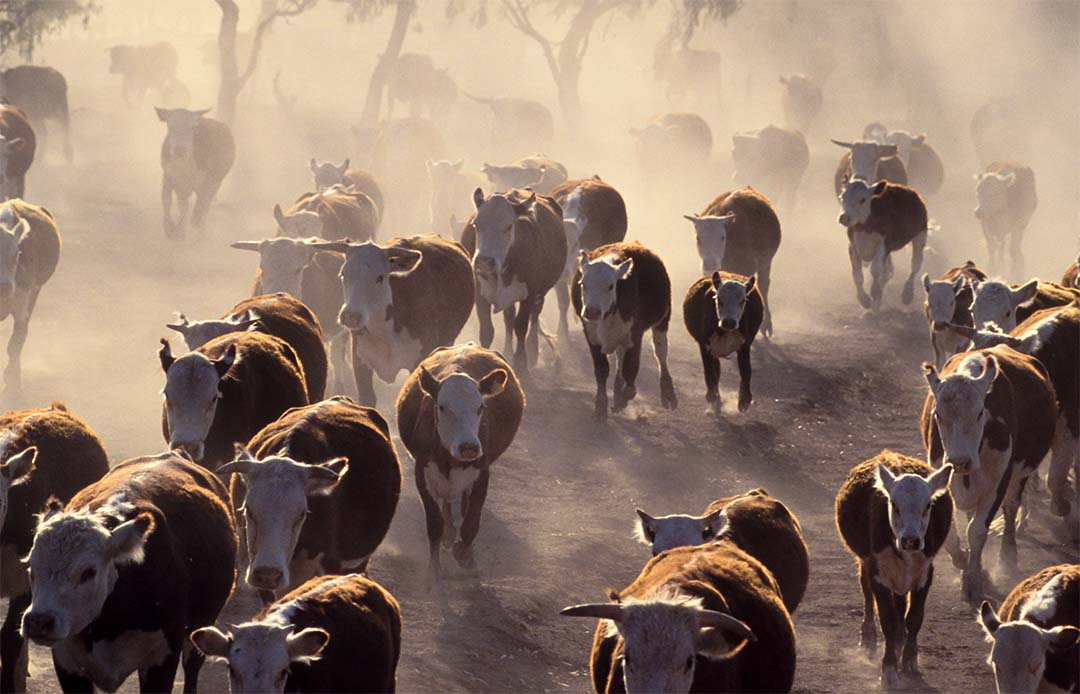The University of New England (UNE) is leading the charge to future-proof regional Australia, with it successfully securing $7.4 million in Drought Resilience Innovation Grants from the Australian Government’s Future Drought Fund (FDF).
Three projects led by Professor Lewis Kahn, Ms Lu Hogan and Dr Tom Davison will improve drought resilience in regional communities and agricultural industries, and empower the next generation of rural scientists to work with producers to adopt a more sustainable approach to farming.
We’re still recovering from the impacts of the severe drought in 2019 and exceptionally wet conditions since then, so it’s vital that we are equipped to deal with similar events in the future that could be more severe, and more frequent.
The Decide and Thrive project, led by Professor Kahn, was awarded just under $3 million, and together with CQUniversity, CSIRO and industry partners, it will develop innovative and regionally relevant livestock ranking strategies to help businesses reduce the impacts of drought and preserve agricultural landscapes.
“Minimising financial, environmental and social impacts of drought on livestock producers relies on making informed decisions about the extent of the livestock sell-down, and the order in which breeders are sold,” says Professor Kahn. “Selling too many will slow the rebuilding phase and selling the wrong breeders will impact future production and financial security. Finding the balance between immediate production (phenotype) and long-term performance (genotype) is key.”
Professor Kahn says a ranking system will be developed using insights into producer mindsets and regional animal performance indicators.
“Strategies will be demonstrated in partnership with commercial livestock producers and outcomes supplied to adoption pathways and commercial developers.”
Minimising financial, environmental and social impacts of drought on livestock producers relies on making informed decisions about the extent of the livestock sell-down, and the order in which breeders are sold.
Meanwhile, Dr Davison will lead a $3 million project, Overcoming the Knowledge Gaps, that will deliver producers with skills and knowledge surrounding deep rooted legumes in grazed pastures and the role of forage conservation of these legumes.
A collaboration between Agrimix, James Cook University, CSIRO and 12 properties from northern New South Wales, Queensland and the Northern Territory, the project will involve the planting of deep rooted legumes to be used in a co-learning approach.
“This will increase grazing system resilience during drought conditions, and will be done by conducting large scale paddock demonstrations to answer key questions about adoption constraints related to planting, establishment, fertility, grazing management and the production of conserved forage,” says Dr Davison. “Each property will have a network of regional producers, consultants and scientists to design comparisons, organise farm walks, and be involved in grazing management courses for regional producers.”
The third project, Empowering Gen Z, is led by UNE’s Lu Hogan and will also have a focus on education. Awarded $1.39 million, it will ensure Rural Science, Veterinary Science, and Agribusiness students from UNE and Charles Sturt University (CSU) are well-equipped to develop, monitor and manage a drought resilient farming system.
Through these projects, UNE and the Drought Hub are making sure Australia is prepared.
“In partnership with UNE SMART Farms and CSU’s Global Digital Farm, farmlets will be established to expose students to regionally relevant best practices for drought resilience, and will compare this with industry average practice,” says Ms Hogan. “This will show the impact on natural resources, animal wellbeing, production and personal wellbeing that result from applying best practice.”
Ms Hogan is the Manager of the recently launched, UNE-led, Armidale Dedicated Node of the Southern Qld and Northern NSW Drought Resilience Adoption and Innovation Hub, which is also funded by the FDF. She says this, along with the three projects, sees that we’re tackling the issue of drought at all levels.
“We’re still recovering from the impacts of the severe drought in 2019 and exceptionally wet conditions since then, so it’s vital that we are equipped to deal with similar events in the future that could be more severe, and more frequent,” she says. “Through these projects, UNE and the Drought Hub are making sure Australia is prepared.”


